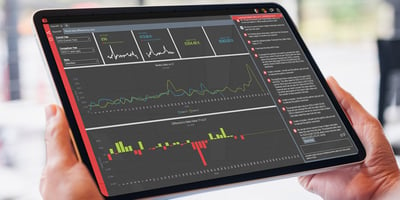The Anthony Nicholas Group (ANG) is home to Fraser Hart and Fields the Jeweller, with a legacy...
Is AI another tech bubble, or the industrial revolution on steroids?
During the SIEPR Economic Summit in May 2023, Alphabet Inc's chairman, John Hennessy addressed hundreds of policymakers, business leaders, and academics. Discussing large language models he stated "this is going to be the industrial revolution on steroids". We've all come across influential figures in the IT sector discussing some innovation that's going to revolutionise one industry or another. So, it's tempting to see this comment, and the current excitement around AI as just that, more over inflated claims about the impact of this new technology.
Indeed, the recent decline in AI tech stock prices, influenced by apprehensions about the returns on significant investments made in the past few years, has sparked discussions like the one featured in the Observer. This article suggests innovation around AI is soon to plateau, and leave us with nothing more than "more ho-hum consumer tech".
We couldn't disagree more. Granted, every period of growth fuelled by technical innovation eventually plateaus, but to suggest we are approaching that point with AI innovation is to fundamentally misunderstand the potential of this technology, how fast it is developing, and how far we still have to go in order to fully harness its rewards. There are obvious examples of where new AI tech already is making a difference; chatbot assistants, generating marketing material, copyrighting, to name a few, but there are many more interesting use cases.
In healthcare, companies like Microsoft’s Nuance Communications, Abridge and Suki have already developed solutions to allow doctors to consensually record their visits with patients and automatically generate clinical notes and summaries. Even more striking is research by various companies (most notably Google) into clinical consultations and diagnosis assisted by, or even conducted by AI. In this article, Google states "in a randomized comparison with real primary care clinicians performing the same simulated text consultations, appropriately trained LLM rated higher than or on par with these consultations when measured for traits like diagnostic accuracy, empathy and helpful explanation". With these advancements, it's entirely feasible that in the near future, we could each possess a virtual personal healthcare assistant on our mobile devices, capable of promptly assessing any health concern on demand, and only directing us to a human specialist if a critical issue arises.
In the legal sector, innovative platforms like LegalFly have revolutionized document creation by automatically drafting new contracts, clauses, and amendments. They also streamline the review process by ensuring legal and policy compliance, suggesting necessary revisions, and providing concise document summaries for litigation preparations or legal and financial due diligence.
In the tech industry, models like GitHub Copilot or Amazon CodeWhisperer integrate with your development environment and suggest code snippets and auto-complete code based on the context, speeding up development. Similar models can analyse code for potential bugs and suggest fixes, and provide developers with valuable examples and explanations to delve into new programming languages and frameworks. They can also aid in translating code between different programming languages, facilitating seamless cross-platform development and updates to legacy code.
In our own sector of the tech industry, business analytics, AI tech is being used extensively. We've used it ourselves to address a long-standing goal of the industry, self-service analytics. While operational users like store managers, sales staff, and production planners have had their data needs met with pre-configured dashboards and reports, strategic users such as CEOs and CFOs have proved more challenging. Constantly navigating changing opportunities and issues, they present constantly changing data requirements. This means they rely on IT departments or business analysts to provide customized data views, which is slow and expensive. In the last eighteen months, we have leveraged AI tech to deliver inmydata copilot, finally addressing these requirements. Now, when those strategic users need that vital piece of information at short notice they can simply ask for it, using natural language, and receive both the answer and a visually engaging chart, all within seconds.
To get a real picture of where we are in this tech cycle, it's worth reflecting on something OpenAI CEO Sam Altman said in an interview back in May this year; "bet that intelligence as a service gets better, and cheaper every year". That certainly rings true from our experience. We had an early version of inmydata copilot built with ChatGPT-3. Whilst we could see the potential of this approach, it wasn't something we felt was reliable enough to release to our customers. Roll forward a few weeks, and with the release of ChatGPT-4, with no effort on our part we had a viable product. The subsequent regular release of improved models has meant the performance of the tool continues to improve, and the cost continues to fall.
So is this just another tech bubble? No, John Hennessy was right. We are currently at the beginning of a transformative period of innovation, driven by AI, that will surpass the impact of the industrial revolution. The current stock volatility is a reflection of the volatility and short-termism of the stock market, rather than the true potential of this technology. The technology, infrastructure, trust, legal frameworks and social frameworks needed to fully realise the potential of this technology will take decades, but in years to come this period of innovation will be seen as an inflection point, where everything changed.
Visit our website to find out more about inmydata. If you're interested in a quick demo, simply submit your email address below and we'll be in touch.




